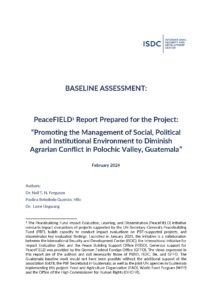This report outlines the research and analysis conducted as part of the baseline study for the project titled “Promoting the Management of Social, Political, and Institutional Environment to Diminish Agrarian Conflict in Polochic Valley, Guatemala.” Funded by the United Nations Peacebuilding Fund (PBF), the project is implemented by a consortium of UN agencies, including the Food and Agriculture Organization (FAO), the World Food Programme (WFP), and the Office of the High Commissioner for Human Rights (OHCHR). Though initially approved to run for 24 months, starting in November 2021; a no-cost extension was granted, such that the full completion of a project activities is envisioned for May 2024.
As the nomenclature suggests, the project focuses on addressing longstanding agrarian conflict in Guatemala, which is characterized by land disputes rooted in existing inequalities and ongoing social tensions that have persisted since the civil war. Specifically, the project works in Polochic Valley, Guatemala, which consists of remote communities that are highly exposed to these issues. Towards preventing and alleviating such agrarian conflicts in this region, the project interventions are centered around three key objectives, namely: strengthening institutional frameworks that govern agrarian conflicts; empowering indigenous communities through for example capacity building for community leaders; and enhancing mechanisms for dialogue and conflict resolution. By focusing on these aspects, the interventions aim to establish effective institutions for managing and resolving land-related disputes; equip indigenous communities with the necessary tools and resources to engage in dialogue; and therefore, to promote peace through disputes being prevented or resolved peacefully.
This research study was conducted at baseline, i.e., prior to program implementation, and has two main objectives: (i) to provide rich descriptive evidence to profile the populations living in the communities targeted by the project; and (ii) to provide insights into the potential impacts that the project may have on conflict-related attitudes and perceptions of beneficiaries. As such, the research study is intended to provide quantitative data to inform current and future programming in the region, as well as to allow better contextualization of more analytic research findings that will emerge at endline.
Towards these goals, the baseline study adopts a primarily quantitative approach, where survey data was collected from (almost all) individuals living in the ten project communities. For the second objective in particular, an experimental approach was embedded in the survey tool; the 605 survey participants across the ten project communities were randomly exposed to varying information about UN programming occurring in their region. Specifically, a subset of participants was informed about the Peacebuilding project that is the focus of this
Publication Details
- Year of Publication: 2024
- Region/s: Latin America & Caribbean
- Theme/s: Impact Evaluation · Micro-Data Collection · Violence & Peacebuilding






